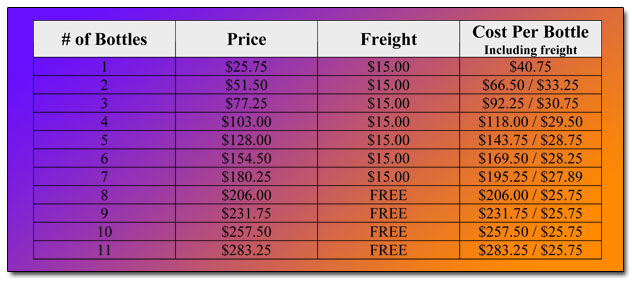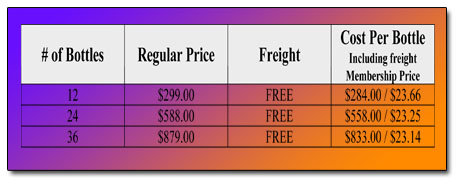




A hot summer greeting to all of my valued Customers, Case Club Members and Friends receiving this August edition of our monthly newsletter!!
As always I hope that this month is bringing you all health and happiness!
In our "From the Desk" section there is an amazing article on how taking Omega-3 fish oil could possibly be a way to not only help your personal overall health - but could help lower a huge risk factor in the environment as well.
Please start by reading a brief context below.
Please enjoy!!!
Sincerely,
Anne-Marie
Context of "Fish Oil Lowers Air Pollution Risk"
(article below) ...
Air pollution is a mix of gases and small bits of solids and liquids called particulate matter (PM). The particles are classified based on their size. Fine particulate matter is less than 2.5 micrometers in diameter and is nicknamed PM2.5. PM2.5 is generated from numerous combustion sources, such as vehicles, diesel engines, power plants, industrial plants and biomass smoke.
Globally, billions of people live in areas with very high levels of particulate air pollution. The problem plagues large cities – especially those in developing countries. In the United States, tougher air pollution standards have reduced PM levels. The U.S. National Ambient Air Quality Standards requires annual and daily average PM2.5 levels less than 15 and 35 micrograms per cubic meter, respectively.
Studies with people show exposure to particulate matter in the air can lead to a variety of health problems such as asthma, stroke, arrhythmia and heart failure. Particulate matter is thought to change lipid levels in the blood. There is strong evidence that fine particles increase cardiovascular disease and related deaths. Just in California, fine particulate air pollution is estimated to cause 9,000 premature deaths per year (California Air Resources Board 2010, PDF).
Epidemiological studies – which observe and compare changes in a human population – show fish oil might prevent pollution-induced effects on the heart. The omega-3 and other fatty acids found in fish might reduce lipid changes in the blood brought on by breathing particulate matter. More indirectly, the fatty acids may relax blood vessels to lower blood pressure and affect nervous system signals that control heart rhythm.
To date, no controlled studies have examined the association. In a controlled study, participants are exposed to known levels of one or more pollutants typically in a laboratory chamber.
Heart rate variability, defined as variation in the time intervals between heartbeats, is a measure of cardiovascular health. Low variability indicates the heart is poorly controlled by the autonomic nervous system – a part of the nervous system that regulates key unconscious functions of the body – and thus the risk of heart disease is increased.
Click here to visit the A-M B-Well Inc. order page and get your PGFO today!!!


Fish oil lowers air pollution risk.
source: http://www.environmentalhealthnews.org
Synopsis by Kai Zhang and Wendy Hessler // August 1st, 2012
Fish oil supplements might protect against adverse effects on the heart that are associated with particulate air pollution, a laboratory study with people has found. After breathing the pollutants, heart rate variability and lipid levels – two measures of heart health – showed little change in those who had eaten fish oil supplements for a month. This is the first controlled experiment to look at the link and suggests that slight changes in the daily diet may counteract some health effects. The findings are most important for people who live in highly polluted areas in the world.
What did they do?
Twenty-nine people aged 50 to 72 took either olive oil or fish oil supplements for a month and then breathed concentrated outdoor air that contained extremely high levels of particulate matter pollution. The participants were healthy and did not have a history of diabetes, cardiovascular disease or pulmonary lung disease. They had not smoked for at least a year.
Researchers randomly assigned 16 of them to eat 3 grams of fish oil supplements daily and 13 of them to eat 3 grams of olive oil supplements daily. A month later, they breathed filtered air through a face mask while sitting in an exposure chamber. A day later, they breathed concentrated, unfiltered air for 2 hours. In both cases, the air was drawn from outside of the building on the University of North Carolina Chapel Hill campus. Fine particulate matter (PM2.5) concentrations were measured.
Heart rate variability (HRV), cardiac repolarization parameters (defined as the time it takes for heart cells to return to their previous resting state after a heart beat) and blood lipid levels were measured before, immediately after and 20 hours following the exposures to both the filtered and concentrated air.
Researchers compared changes in each participant's HRV, cardiac repolarization and blood lipid levels immediately and approximately 20 hours after the exposures.
What did they find?
The average concentrations of PM2.5 in ambient, filtered and concentrated air were 12, 0.2 and 278 micrograms per cubic meter, respectively.
After a short exposure to the high levels of particulate air pollution, heart rate variability decreased significantly in the participants who ate olive oil supplements. In contrast, the subjects on fish oil supplements showed little change.
Researchers also found that the olive oil group showed longer repolarization duration and an immediate increase in two types of lipid levels in the blood (very low-density lipoprotein and triglycerides) after the exposures to concentrated air compared to the fish oil group.
What does it mean?
This is the first controlled exposure study to show that taking fish oil can reduce cardiac symptoms caused by exposure to particulate pollution. The results provide stronger evidence of the role of fish oil in alleviating cardiovascular effects than other human studies done to date.
The finding is most important for people who live in cities and other places with bad air quality.
The study identified two ways the fish oil offered protection against particulate exposure.
First, heart rate variability measures differed between the fish oil and olive oil groups. The fish oil protected against changes to the automatic nerve controls that regulate the electrical signals guiding how often the heart beats (rhythmia) and how quickly it can recover. Fish oil is rich in omega-3 polyunsaturated fatty acids, which are believed to prevent the reduction of heart rate variability caused by particulate air pollution. Low heart rate variability is associated with death and arrhythmia.
Second, exposure to the air pollution changed blood lipid levels in the olive oil group. After exposure, an upsurge in the types of fats linked to heart disease was measured in those taking olive oil but not in those taking fish oil supplements. These lipids might play a role in atherosclerosis, commonly known as hardening of the arteries.
Many people in the world are exposed to particulate air pollution that may be contributing to ill health. The results of this study suggest that personal actions – taking fish oil capsules daily – may provide a more cost-effective strategy to protect health than mitigating particulate matter emissions on a global, national or local level.
However, the subjects in this study were recruited and did not represent a general population. Therefore, before fish oil supplements can be advocated as a large-scale intervention action, more research is needed to confirm these findings apply to people of different age groups, sex, races, and other personal and social factors.
Click here to visit the A-M B-Well Inc. order page and get your PGFO today!!!






5 ml. = 5 capsule
125 ml. / 4 ozs. per bottle
CLICK
HERE
to read label ingredients

90 capsules per bottle
CLICK
HERE
to read label ingredients




A-M B-Well™ Omega-3 PGFO has been third party tested according to the parameters established by the Council for Responsible Nutrition (“CRN”) and the World Health Organization (“WHO”) for its potency and purity by http://www.ifosprogram.com/ and receives a 5 Star rating.
Omega-3 PGFO capsules and Omega-3 Liquid Gold are identical in price, being $25.75 per bottle. Below is a chart listing the prices on the Order Page for Canada and U.S. Retail. The price shows the total price for 1 to 11 bottles with the freight included, then breaks it down by the price per bottle. 8 to 11 bottles are shipped freight-free.
The second chart called Case
Club Membership lists the prices on the Order Page for Canada and U.S.
Wholesale. This chart is to show you how much money you can save per bottle
if you order by the case (12 bottles) and also join the Case Club. You
will further note that the second chart also shows the total price for
bottles for 12, 24 and 36 bottles based on Regular and Case Club prices,
then breaks it down by the price per bottle. As you can see, you are paying
considerably less per bottle by ordering in bulk.





Case Club membership is
$25 per annum.
Club membership gives you a 5% discount on all
your case purchases for one year.
A good idea for customers purchasing 2 or more cases per year.
Visit
our Order Page and choose your Country.
You will be able to choose between Omega-3 PGFO Capsules and Omega-3 Liquid
Gold or order both together.
Warmest Regards,
Anne-Marie

